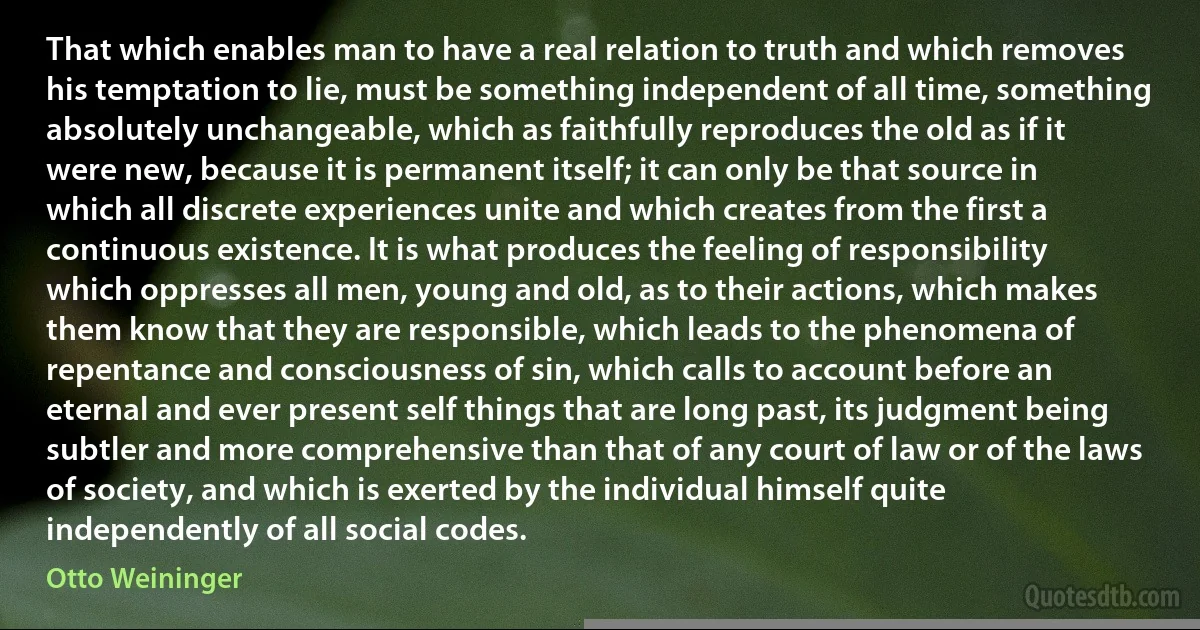
That which enables man to have a real relation to truth and which removes his temptation to lie, must be something independent of all time, something absolutely unchangeable, which as faithfully reproduces the old as if it were new, because it is permanent itself; it can only be that source in which all discrete experiences unite and which creates from the first a continuous existence. It is what produces the feeling of responsibility which oppresses all men, young and old, as to their actions, which makes them know that they are responsible, which leads to the phenomena of repentance and consciousness of sin, which calls to account before an eternal and ever present self things that are long past, its judgment being subtler and more comprehensive than that of any court of law or of the laws of society, and which is exerted by the individual himself quite independently of all social codes.
Otto WeiningerRelated topics
account comprehensive court judgment men law lie man past present quite real repentance self sin something source temptation time truth young unchangeable things LawsRelated quotes
The term "cult" is always one of individual judgment. It has been variously applied to groups involved in beliefs and practices just off the beat of traditional religions; to groups making exploratory excursions into non-Western philosophical practices; and to groups involving intense relationships between followers and a powerful idea or leader. The people I have studied, however, come from groups in the last, narrow band of the spectrum: groups such as the Children of God, the Unification Church of the Reverend Sun Myung Moon, the Krishna Consciousness movement, the Divine Light Mission, and the Church of Scientology. I have not had occasion to meet with members of the People's Temple founded by the late Reverend Jim Jones, who practiced what he preached about being prepared to commit murder and suicide, if necessary, in defense of the faith.

Margaret Singer
First of all I want to remind you of the essential features of models. In my opinion they are: (i) drawing up a list of the variables to be considered; (ii) drawing up a list of the equations or relations the variables have to obey and (iii) testing the validity of the equations, which implies the estimation of their coefficients, if any. As a consequence of especially (iii) we may have to revise (i) and (ii) so as to arrive at a satisfactory degree of realism of the theory embodied in the model. Then, the model may be used for various purposes, that is, for the solution of various problems. The advantages of models are, on one hand, that they force us to present a "complete" theory by which I mean a theory taking into account all relevant phenomena and relations and, on the other hand, the confrontation with observation, that is, reality. Of course these remarks are far from new.

Jan Tinbergen
Truly there is no cause for you to be miserable and unhappy. You yourself impose limitations on your true nature of infinite Being and then weep that you are but a finite creature. Then you take up this or that sadhana to transcend the nonexistent limitations. But if your sadhana itself assumes the existence of the limitations, how can it help you to transcend them? Hence I say know that you are really the infinite, pure Being, the Self Absolute. You are always that Self and nothing but that Self. Therefore, you can never be really ignorant of the Self; your ignorance is merely a formal ignorance... Know then that true Knowledge does not create a new Being for you; it only removes your "ignorant ignorance." Bliss is not added to your nature; it is merely revealed as your true and natural state, eternal and imperishable. The only way to be rid of your grief is to know and be the Self.

Ramana Maharshi
Of our studies it is impossible to speak, since they held so slight a connection with anything of the world as living men conceive it. They were of that vaster and more appalling universe of dim entity and consciousness which lies deeper than matter, time, and space, and whose existence we suspect only in certain forms of sleep - those rare dreams beyond dreams which come never to common men, and but once or twice in the lifetime of imaginative men. The cosmos of our waking knowledge, born from such an universe as a bubble is born from the pipe of a jester, touches it only as such a bubble may touch its sardonic source when sucked back by the jester's whim. Men of learning suspect it little and ignore it mostly. Wise men have interpreted dreams, and the gods have laughed. One man with Oriental eyes has said that all time and space are relative, and men have laughed. But even that man with Oriental eyes has done no more than suspect....

H. P. Lovecraft
What all this amounts to, then, is that the Rule of Law requires that administrative discretion in coercive action (i.e., in interfering with the person and property of the private citizen) must always be subject to review by an independent court which is not an instrument of, or even privy to, the aims of current governmental policy; that its review must in all such instances extend to the substance of the administrative act and not merely to the question whether it was infra or ultra vires; and that, if such a court finds that the rights of private citizens have been infringed, it will assess damages just as if the right of this person had been violated by another private citizen. This, in addition to the familiar requirements of generality, equality, and certainty of the law is really the crux of the matter, the decisive point on which it depends whether the Rule of Law prevails or not.

Friedrich Hayek
